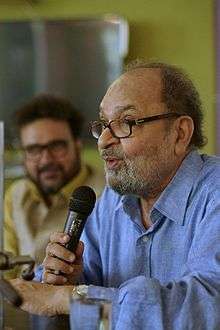Saeed Naqvi
| Saeed Naqvi | |
|---|---|
 Saeed Naqvi - September 2016 | |
| Born | 1940[1] |
| Occupation | journalist, television commentator, interviewer |
Saeed Naqvi is senior Indian journalist, television commentator, interviewer. He has interviewed world leaders and personalities in India and abroad, which appear in newspapers, magazines and on national television, remained editor of the World Report, a syndication service on foreign affairs, and has written for several publication, both global and Indian, including the BBC News, The Sunday Observer, The Sunday Times, The Guardian, Washington Post, The Indian Express, The Citizen and Outlook magazine. At the Indian Express, he started in 1977 as a Special Correspondent and eventually becoming, editor, Indian Express, Madras, (1979–1984), and Foreign Editor, The Indian Express, Delhi in 1984, and continues to writes columns and features for the paper.[2][3][4]
Education
He received his primary education from the La Martiniere College. He was a Parvin Fellow at the Woodrow Wilson School of Public and International Affairs, Princeton University, US. He studied Journalism at the Thomson School of Journalism, Cardiff, UK.
Career
Saeed Naqvi started his journalist career as Staff Reporter with The Statesman, Delhi in 1964, later he became editor of the Sunday Magazine. During this period, in spring of '68, when The Beatles visited Maharishi Mahesh Yogi's ashram in Rishikesh, he famously sneaked in along with fellow photographer, Raghu Rai and they not only filed new reports, but also took photographs inside.[5][6]
As editor and producer, of WORLD REPORT, a weekly foreign affairs show on Doordarshan (the national network) called Worldview India, apart from a prime time international news and features series entitled It's A Small World (1997–1999) for Star TV. From 1986–1997 WORLD REPORT produced an international affairs series entitled World Report for Doordarshan, featuring interviews with major world leaders.
Thereafter it produced a series of programmes entitled Hamara Bharat (Our India) on India's syncretic culture. Saeed has been Editor, Foreign Editor, Foreign Correspondent for major Indian dailies – The Indian Express, The Statesman and written for a range of publications like New York Times, The Sunday Times, The Guardian, Washington Post, Boston Globe and others.
Books
- Reflections of an Indian Muslim, Har-Anand Publications, 1993. ISBN 8124100217.
- The Last Brahmin Prime Minister? Har-Anand Publications, 1996.
Research
- Armed Intervention in International Affairs in collaboration with the Institute of Philosophy and Public Issues, University of Melbourne, Australia.
- Communication, Politics, and Media in Islamic Societies.
- Does the War on Terror increase the chance of Pashtunistan.
- Kosovo – wider implications.
- Afghanistan – Will the US leave?
- The Arab Spring – Promises and Challenges – based on extended journeys in the region
- The future of Syria
In pursuit of his vision that Indians must cover foreign affairs, Saeed has travelled to over a hundred countries. Interviewed world leaders like, Nelson Mandela, Mikhail Gorbachev, Fidel Castro, Col. Qaddafi, Daniel Ortega of Nicaragua, Henry Kissinger, Dr. Zbigniew Brzezinski, Shimon Peres, Israel, UN Secretary Generals Perez de Cueller Boutros-Boutros Ghali, Kofi Annan, Ban Ki-Moon, Prime Minister Binyamin Netanyahu, Prime Minister Yitzhak Rabin, Prime Minister Yitshak Shamir, Israel, Ali Akbar Vilayati, Gen. Parvez Musharraf, Tariq Aziz of Iraq, Rafsanjani of Iran, Foreign Secretary of State Colin Powel, Ahmad Chalabi, Iraqi Shia leader, Benazir Bhutto, President Hamid Karzai, Prime Minister Romano Prodi, President Jacques Chirac, Egyptian President Hosni Mubarak, Prince Hassan of Jordan, Turkey's President Abdullah Gul, Former US Ambassador Robert D. Blackwill, HRD Minister Farooq Abdullah, Director Shyam Benegal, Actor Naseeruddin Shah, Architect Charles Correa, among others.
Awards
- National Integration Award 2003, awarded by the National Commission for Minorities in New Delhi on 18 December.
The award was conferred "for his outstanding contribution towards promoting communal harmony and national integrity".[7]
References
- ↑ http://indiatoday.intoday.in/story/muslim-in-india-saeed-naqvi-book/1/709375.html
- ↑ "Research Faculty – Mr. Saeed Naqvi". Observer Research Foundation.
- ↑ Naqvi, Saeed (December 2002). "Muslim hopes and fears: Analysis". BBC News.
- ↑ "Shri Saeed Naqvi". Department of Education, Govt. of India.
- ↑ "Hidden camera: Photographer Raghu Rai on how he sneaked into the ashram for a shot of the Beatles". 17 May 2008. Mint (newspaper). Check date values in:
|date=(help) - ↑ "The spring of '68". Mint. 17 May 2008.
- ↑ Awards The Milli Gazette, January 2003, accessed June 2007
External links
- Saeed Naqvi, website
- Saeed Naqvi, columns at The Indian Express
- Saeed Naqvi, columns at Outlook
- Saeed Naqvi at NewsX